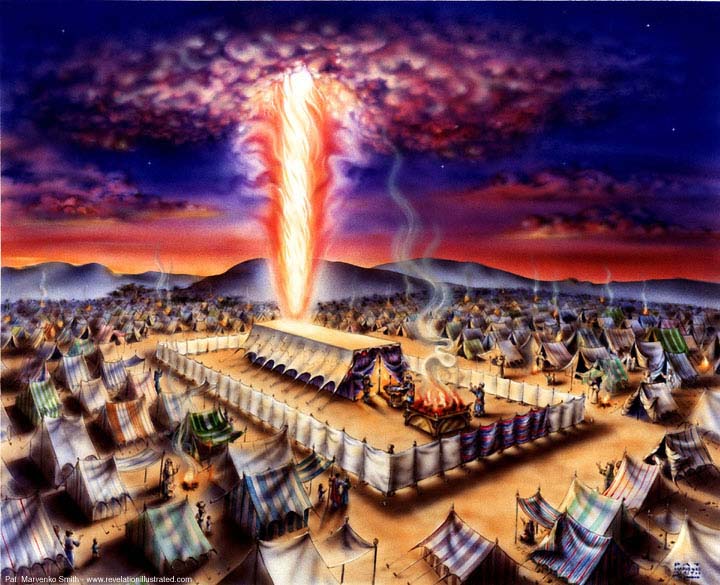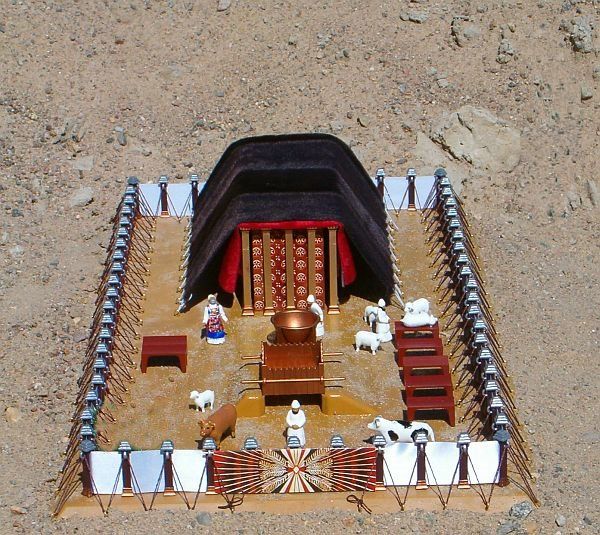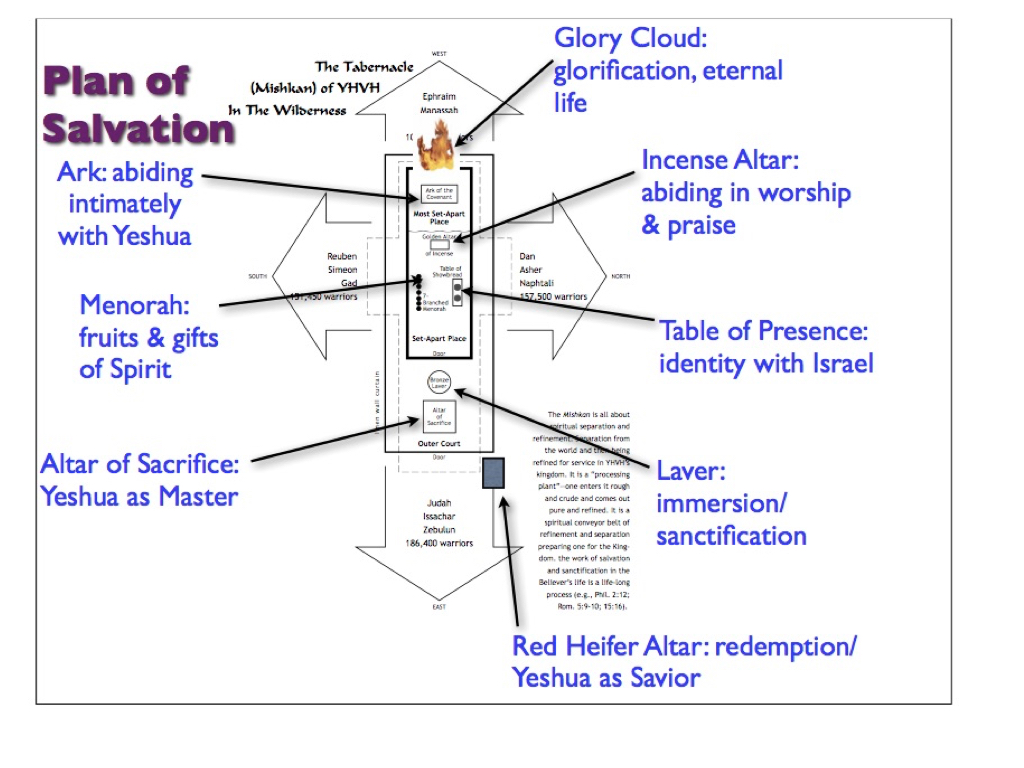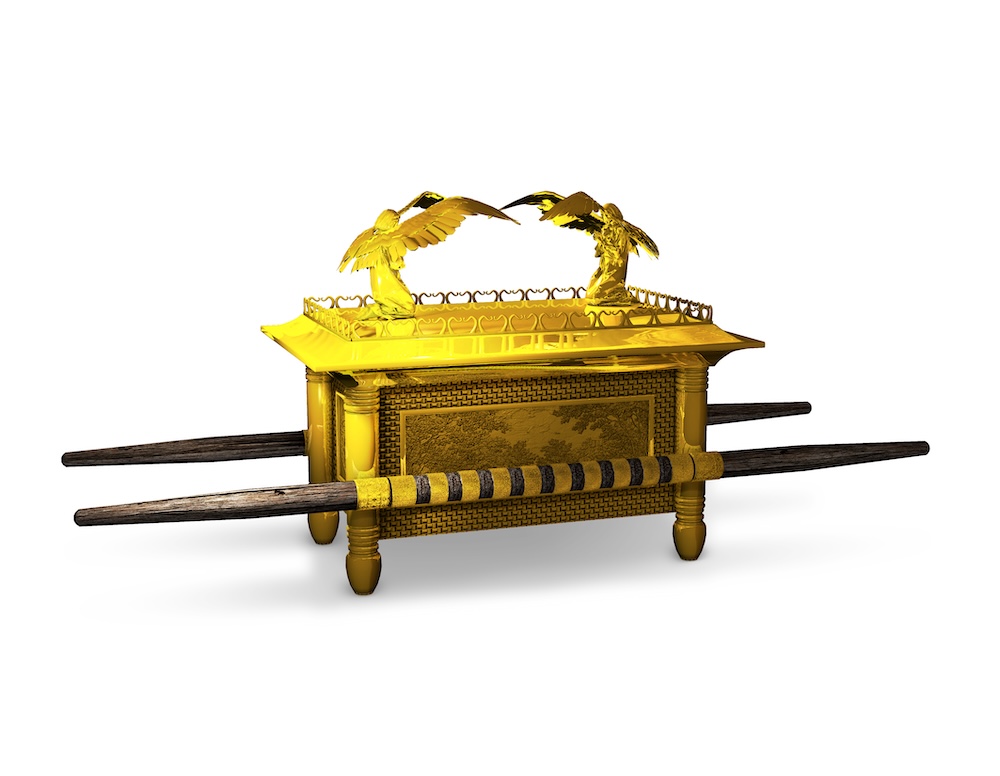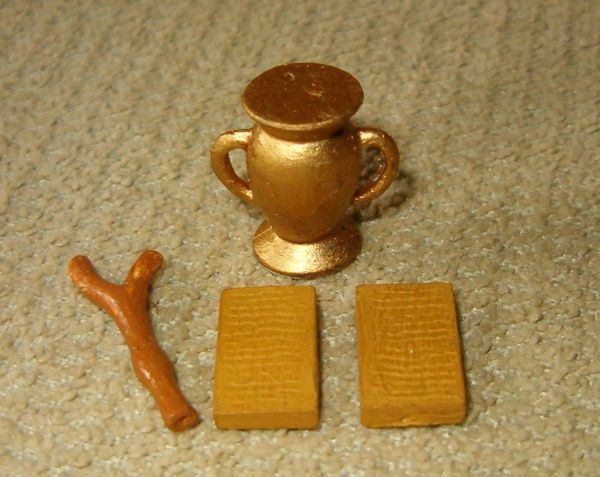Nathan’s Commentary on Parashat Mishpatim Exodus 21:1–24:18

Exodus 21
Exodus 21–23, YHVH lays out for his people the basic principles of morality and righteousness.
YHVH’s Method of Teaching His Children His Divinely Revealed Truth
After having given the ten statements (or ten commandments), which forms the basic cornerstone of the YHVH’s whole Torah-law and out of which all of his other commandments emanate, YHVH now expanded on these basic principles in chapters 21 to 23. These scriptures contains the fundamental principles of how to love YHVH Elohim wholly and one’s neighbor as oneself (otherwise known as “the golden rule”).

Exodus chapters 20 to 23 contain the basic laws and principles for a society to function smoothly at a high level spiritually. They form the foundation of societal governance, which the new nation of Israel needed in order to survive without falling into anarchy while remaining in right relationship with their Elohim as a holy or set-apart nation surrounded by heathen nations.
It is also interesting to note that YHVH did not give Israel all 613 Torah laws at once, but introduced them to his people little-by-little on an as-need basis so as not to overwhelm them too quickly. He led and taught the children of Israel as loving and patient parents teach their children them little-by-little in small doses so as not to overwhelm them. This is the same method that the Spirit of Elohim use to this day to teach new disciples of Yeshua about the Truth of the Bible little-by-little and step-by-step. In this same manner, wise and godly Bible teachers will teach their disciples the principles of godly living.
YHVH started with the ten statements of Exodus 20, then expanded these ten into the basic laws in chapters 21 through 23, and he then goes from there instructing the Israelites in ways of righteous living. This teaches us another truth about how YHVH operates with his human children: he reveals himself to those who seek him slowly and methodically over time. He and his ways are too transcendently great and expansive for the mind of man to encompass all at once.
For my thoughts are not your thoughts, neither are your ways my ways, saith YHVH. For as the heavens are higher than the earth, so are my ways higher than your ways, and my thoughts than your thoughts. (Isa 58:8–9)
This measured and progressive method of divine truth revelation is exactly how the apostles chose to reveal YHVH’s truth to the new Gentile converts in Acts 15—little by little. First they heard the gospel message and came to Messiah, then they were given basic rules to follow in order to enter into the fellowship of the saints, then they would learn the laws of Moses over time each Sabbath in the instructional setting of the local synagogue.
Learning the divinely revealed truths of Elohim and his ways of righteousness as found in the Bible is a step-by-step process that will last a lifetime as each of us grows up from spiritual childhood into mature, adult sons and daughters of YHVH Elohim.
Exodus 21:1, These are the judgments [mishpatim]. Mishpat (pl. mishpatim) means “judgment, justice, ordinance, sentence, legal decision or seat of judgment.” Most of these laws (as listed in chapters 21 through 23) are civil in nature and govern our relationship with our fellow man as summarized by the phrase in the shema, “you shall love your neighbor as yourself” (Lev 19:18), or by “golden rule” of Yeshua: “Therefore, whatever you want men to do to you, do also to them, for this is the Law and the Prophets” (Matt 7:12). Thus, most of these laws would correspond to the second half (the fifth through tenth) of the ten statements of Exodus 20. Some, however, relate to the first four commandments, which show man how to love Elohim including prohibitions against worshiping idols and pronouncing the names of pagan deities as well as instructions regarding the seventh day Sabbath, tithing, obeying the Messenger of Elohim, and celebrating YHVH’s feasts).
In reality, chapters 21 to 23 are simply an expansion or extension of the fundamental principles laid down in YHVH’s ten statements of chapter 20. This then makes the ten statements a remez or “a hint” suggesting that there are additional laws that form the larger body of YHVH’s Torah. The ten statements of Exodus 20 are simply springboards that point man toward the larger body of YHVH’s legal structure that is laid out in his full Torah. The ten statements are like the cornerstone of the building of Torah. Each of these judgments can be traced back to a fundamental principle laid out in the ten statements. For example, the laws pertaining to servitude are to prevent men from stealing from his neighbor via debt and the consequences of one’s inability to pay one’s debts. The laws pertaining to physical violence against one’s neighbor are an extension of the law against murder, fornication. The law against bestiality is an extension of the law against adultery. The law prohibiting sorcery is an extension of the law against idolatry, while not afflicting the widows or fatherless is from the law against theft. The prohibition against slander comes is an extension of that against lying, and the biblical feasts or annual sabbaths spring out of the weekly Sabbath. Being obedient to the Messenger of YHVH comes out of the first and second statements about YHVH being the Elohim of Israel and following no other gods. Moreover, the death a person by someone’s animal is an expansion of the “thou shalt not murder” command. The charging of usury on loaned money is an expansion of the commands not to covet or steal. The land sabbath and annual sabbaths (i.e., YHVH’s appointed times or moedim) are an expansion of the weekly Sabbath.
It should be obvious to see how all of YHVH’s Torah commands can easily be expanded out of the original ten, which form the foundation for the rest of the Torah. Additionally, the approximately 1056 imperative commands found in the Testimony of Yeshua all spring from the original 613 commandments found in the Torah. YHVH’s Word would be in opposition to itself if any of the 1056 were to contradict or nullify any of the Torah’s 613. If they did, that would make YHVH into a liar and his word inconsistent with itself. This cannot be (Mal 3:6; Heb 13:8; John 10:35)!
Exodus 21:6, Bore his ear. The servant who of his own freewill and out of love for his master chose to remain in his maser’s household forever (i.e., the rest of his life) was permanently marked in this manner to signify that he was willing to hear and obey all his master’s commands punctually. This is a spiritual picture of the disciples of Yeshua who chose to become his bond servants (e.g., Rom 1:1; Gal 1:10; Col 4:12; Tit 1:1; Jas 1:1; Jude 1; Rev 1:1; 15:3). Not only do the true disciples of Yeshua accept him as their Savior, but they submit to him as their Lord or Master. They accept the fact he has purchased them with his blood, and that they now owe their lives to him. They have willingly chosen to dwell in his spiritual house forever, to serve him and to hear and to do all that he commands of them. Yeshua is, after all, not only the saint’s Savior but also his Lord or Master. Why? Because the saint was”bought with a price” (1 Cor 6:20; 7:23); that is, “you were not redeemed with corruptible things, like silver or gold, from your aimless conduct received by tradition from your fathers but with the precious blood of Christ, as of a lamb without blemish and without spot” (1 Pet 1:18–19).
Forever. The Hebrew word olam translated as “forever” throughout the Scriptures means “as long as the conditions exist” and not necessarily “for eternity” as the meaning of the English word “forever” often implies. In this verse, forever obviously means “as long as the servant shall live” and not “for eternity.” When the Hebrew word v’ad translated as “and ever” is added to olam (forever), the concept of eternity is connoted (e.g., YHVH’s reign as king is for eternity, Exod 15:18; Ps 10:16; the resurrected righteous will live for eternity, Pss 21:4; 45:6; Dan 12:3; during the millennium, righteous redeemed Israelites will walk with YHVH for eternity, Mic 4:5; the righteous will keep YHVH’s Torah for eternity, Ps 119:44; the righteous will praise YHVH for eternity, Ps 145:1, 2, 21).

Exodus 21:10, Takes another wife. Polygamy (also colloquially referred to as plural marriage or patriarchal marriage) is neither prescribed nor proscribed in the Bible. In biblical times, its practice was infrequently occasioned out of necessity usually because of the barrenness of a man’s first wife. A man occasionally needed to take a second wife to bear him a son to carry on the family tribal or kingly lineage or for the purpose of political alliances. However, in every instance where polygamy is recorded in Scripture, it is accompanied by marital and familial jealousy, rivalry, strife and division (e.g., Abraham, Jacob, Samuel’s parents, David and Solomon). Thus, one cannot look to polygamy as a biblically embraced ideal marriage situation. Rather, YHVH gave Adam one wife (not two or more), and commanded him to procreate with her. One wife for life is the biblical ideal. However due to less than ideal circumstances, human weakness or outright carnal reasons, YHVH allowed for a man to take another wife, and if done, he was commanded to not favor his second wife over his first as this verse states.
Exodus 21:22, Hurt a woman with child.The Bible on the Sanctity of Life and Abortion This passage is one of the strongest pro-life, anti-abortion verses in the Scriptures. Clearly, this passage teaches us that life begins in the womb. The penalty for a man who is responsible for the death of an unborn child is death (v. 23.) Could any clearer statement be made about how the Creator feels about the sanctity of life? Here are some statistics about abortion:

- 42 million abortions occur worldwide each year (that’s 115,000 per day).
- In 2008, 1.21 million abortions occurred in the U.S.
- From 1973 to 2008, 50 million legal abortions occurred in the U.S.
- 22 percent of all U.S. pregnancies end in abortion.
- In 2007, 84% of all abortions were performed on unmarried women.
At current rates, nearly one-third of American women will have an abortion.
(Sources of information: abortionno.org/Resources/fastfacts.html; guttmacher.org/pubs/fb_induced_abortion.html; abort73.com/abortion_facts/us_abortion_statistics/ — this is now a dead link).
Thankfully, as of this writing, the abortion rate in the US is slowly, but steadily dropping. In 2000 according to the National Right to Life (NRL), 1.36 million babies were aborted. The Center for Disease Control (CDC) puts the number at 857,475. In 2014 according to the NRL the number of abortions in the US dropped to 926,240. According to the NRL the total number of abortions performed in the US from 1973 to 2013 was nearly 58.6 million, while the CDC puts the number at nearly 51.9 million.
The murder of the innocent children is perhaps the greatest sin that a nation can commit. Abortion is a form of child sacrifice, which is something many ancient cultures practiced (e.g., the Aztecs, Incas, Phoenicians, pre-Islamic Arabs, and the biblical Canaanites). In the Bible, YHVH condemns the practice of the heathens and apostate Israelites who made their children pass through the fire in the worship of the demon-god Moloch (see Lev 18:21; 20:2–5; Deut 12:30–31; 18:10). YHVH placed on the nation of Israel a severe judgment for sacrificing its children to Moloch (or Chemosh). He promised that their cities would be destroyed, that their nation would be conquered by foreigners, and that the Jews would be taken captive (see Jer 7:30–34; 32:35–36).
Exodus 21:22 clearly delineates the Creator’s position that human life begins at conception (see also Ps 139:13–16; Jer 1:5; Luke 1:15, 41, 44), not at birth as he so-called Pro-Choice deceivers aver.
Exodus 21:26–27, Eye…Tooth. This is the well known “eye for an eye and tooth for a tooth passage.” This is a remez meaning that these verses lay out a principle that is broadly applicable to many situations. That is to say, what this verse is teaching us is that justice is properly served when the crime fits the punishment or when the criminal is himself deprived of that which he deprived his victim. To be sure, such a punishment is a strong deterrence to criminality! In the case of one causing another person an injury for which one cannot recompense the victim (in the case of a loss of an eye or tooth), the criminal must suffer the same fate as his victim. In the case where a criminal causes harm to another (such as theft), which can be repaid, it is the criminal’s responsibility to make restitution.
Exodus 22
Continue readingBiblical Ram’s Horn Shofar Mysteries Revealed—The Saints’ Secret Weapon
From the time of Abraham to Mount Sinai, to defeating Israel’s enemies, to the prophets’ warning call, to summoning Messiah’s bride to prepare for the marriage of the Lamb, to the pouring out of the end times wrath of Elohim upon Earth’s rebellious inhabitants, to announcing the return of Yeshua the Messiah, to the resurrection of the saints, the biblical ram’s horn shofar has played a key role in the life of Elohim’s people for thousands of years to this day. When sounded, the shofar sends terror and confusion into Satan’s camp, while causing the Divine Ear of heaven to listen. It is still a potent weapon and praise instrument in the hands of today’s saints when used with wisdom and understanding as this teaching reveals.
For Nathan’s written study notes on this subject, go to https://hoshanarabbah.org/blog/2026/0….
This and other videos by Nathan are available as podcasts on Spotify and Apple podcast under “Hoshana Rabbah.”
If you are interested in participating in Hoshana Rabbah’s weekly Shabbat online fellowship (Oasis Elim Online), send an email to hoshanarabbah@earthlink.net.
Nathan’s Commentary on Parashat Yitro Exodus 18:1–20:23

Exodus 18
Exodus 18:2–3, After he had sent her back.This verse suggests that Moses divorced his wife after their altercation over the circumcision of their sons (Exod 4:24–26). If so, what are the spiritual implications of this for us today?
The phrase sent away/back in verse two is the Hebrew shilluach which according to Strong’s Concordance and Gesenius’ Hebrew Lexicon can be a biblical term referring to divorce. Shilluach is from shalakh, a basic verb meaning “to send,” where in Isaiah 50:1 and Jeremiah 3:1 the prophets use it referring to YHVH’s divorce from the house of Israel or Ephraim.
Though rabbinical commentators Rashi and Hirsch fail to note the possibility of Moses’ divorce (Jewish Torah commentators tend to gloss over the faults of their great biblical heroes), Medieval Jewish Torah scholar Baal HaTurim notes this possibility in his commentary.
Yet in Exodus 18:2, YHVH still views Zipporah as Moses’ wife. What is going on here? Before this, Zipporah seems to have evidenced reluctance at obeying YHVH’s command to circumcise their sons (Exod 4:25), so did Moses put her away (divorce her) as a result? Was Moses, as the human “savior” of Israel from Egypt and an antetype (or prophetic forerunner) of Yeshua the Messianic Savior (Deut 18:15–19) in that he had to deal with a rebellious wife, even as Yeshua (in his preincarnate state as YHVH of the Tanakh) had to deal with his rebellious Israelite wife and eventually had to put her away?
Zipporah is never again mentioned in the Torah and, in fact, we see the possibly that the divorced Moses even married another woman (Num 12:1)—apparently a black woman from Ethiopia. Is this a prophetic picture of Yeshua remarrying his former wife (Israel) during the time of the Renewed/New (Marriage) Covenant (Ketubah), who has adulterously mixed herself with the nations and returns to him in a mixed racial (spiritually and biologically-speaking) condition (Hos 7:8)?
Thus, it is possible that Moses had to divorce his wife because she not only was reluctant to circumcise her sons, but there is no biblical record that she followed Moses in his divine commission to lead the children of Israel out of Egypt much less into the wilderness. If this is the case, then this is reminiscent of Lot’s wife who refused to follow her husband at YHVH’s command and chose instead to return to Sodom. It happened in Bible times and still does in our time that YHVH gives a ministry commission to a man and the wife refuses to follow with the marriage ending in divorce as the two go their separate ways.
If Moses led Israel as a divorced and remarried man, does this change your perspective about him? This could also affect our perspective on divorced people in ministry whose unsaved spouses are adversarially opposed to their spouses divinely commissioned ministry calling.
Moses and the Ethiopian Women. Moses’ marriage to the Ethiopian woman can be found in Josephus Antiquities of the Jews, book 2, chapter 11 (Ant. 2:11.1–2). According to Josephus based on Jewish tradition, she was one of the “spoils” of war when Moses, on behalf of the Egyptian monarchy, led an Egyptian army triumphantly against the Ethiopians who had invaded Egypt. The Ethiopian woman was a daughter of the king of Ethiopia. So quite possibly after Moses fled Egypt for Midian as a wanted criminal, he must have assumed that he would never return to Egypt and see his Ethiopian wife again, which, in his mind, freed him up to marry Yitro’s daughter, Zipporah. This marriage would have been before Moses was “saved” and before Elohim called and commissioned him at the burning bush in Exodus chapter three. So, when Zipporah refused, apparently, to follow him on his divinely appointed mission to Egypt, she abandoned him, which is why Moses had dismissed, divorced or sent her back (see Exod 18:2 where we read that Moses had “sent her [Zipporah] back,” Heb. shillûach meaning “dismissed, i.e., divorced”). It also appears that the righteous and YHVH-fearing Yitro tried to reconcile Moses and Zipporah when he brought her to Moses in Exodus 18:6. Moses implored Yitro to remain with him and accompany him in the wilderness (Num 10:29). However, the aged Yitro, and presumably along with his daughter, refused Moses’ plea ostensibly preferring the safety, security and familiarity of his own home in Midian over the uncertainties and inconveniences of wandering like a nomad in the wilderness. So Moses let Yitro return (Exod 18:27) evidently taking Zipporah with him, for it appears based on the textual evidence that she wanted nothing to do with Moses’ mission. Therefore, Moses, being left alone without a marital partner to accompany him on his divine mission, may have called back his former Ethiopian wife to join him, which she obviously did causing the scandal we read about it Numbers 12. If these suppositions are correct which the biblical and secular historical evidence seems to suggest that they are, this all goes to show that love, marriage and divorce and remarriage can lead to difficult, complex, sticky and divisive issues. Nevertheless, and obviously, YHVH’s merciful grace prevailed and Moses went forward approved of Elohim on his mission of leading the Israelites to the Promised Land.
To be sure, divorce and remarriage is not YHVH’s ideal for people because of all the attendant and problematic issues it engenders. The Bible is clear. YHVH’s perfect will from the beginning has always been one man for one woman until death separates them. But humans are imperfect, and YHVH’s grace is sufficient, and so there for his grace go each of us, as the saying goes.
Exodus 18:24, Chose able men. Here we see Moses choosing elders or judges over the congregation of Israel. These were “able men of accomplishment” in Israel. Compare this with Paul’s instructions about the qualifications of an elder in 1 Timothy 3:1–13 and Titus 1:5–9. If Moses was divorced at the time of his choosing the elders of Israel, does this clarify Paul’s statement that an elder must be “the husband of a [often mistakenly misunderstood to mean “one’s first and only wife” —a meaning not suggested by the Greek] wife”(1 Tim 3:2)? It would appear that the Scriptures do not prohibit divorced and remarried people from holding leadership positions (if the grounds for divorce are biblically legal) in the household of faith as some churches teach.
Exodus 19
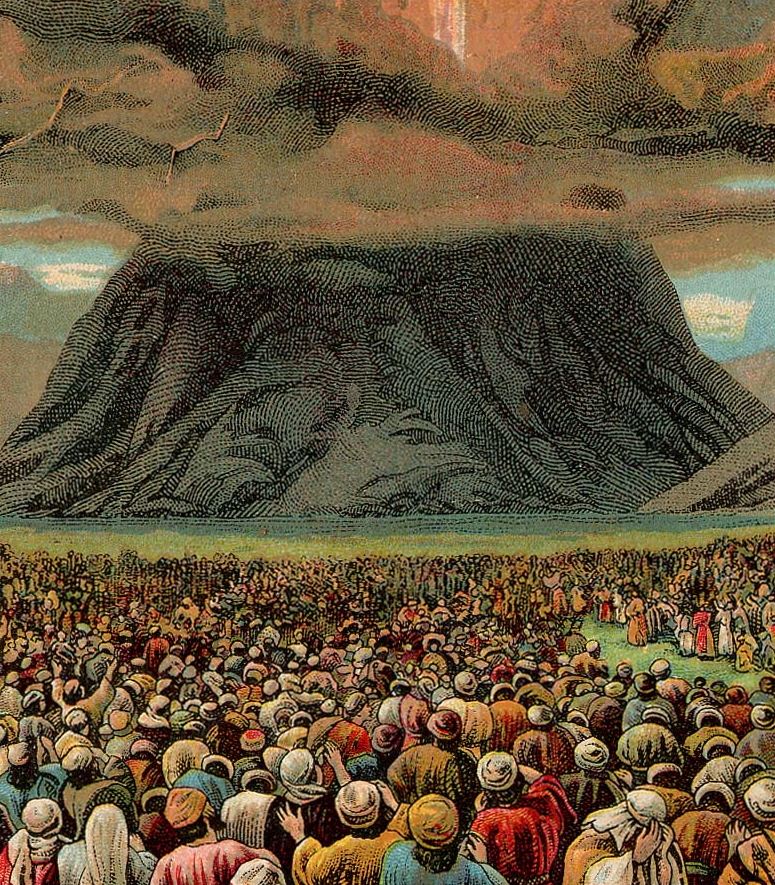
Exodus 19:1, The third month. YHVH gave his Torah-instuctions in righteousness to Israel at Mount Sinai most likely on the Feast of Weeks (Chag haShavuot or Pentecost; Lev 23:15–21), which occurred in the third month of the biblical year. On the very same day, some 1,500 years after YHVH gave the Israelites his Torah-law at Mount Sinai another momentous event occurred. On the day of Pentecost in Acts chapter two, the Spirit of Elohim descended upon Yeshua’s disciples—the literal descendants of the children of Israel—who were gathered in one accord, and on that day YHVH wrote the very same Torah on the hearts of the disciples in fulfillment of Jeremiah’s prophecy (Jer 31:31–33 and Acts 2:1, 37 cp. Heb 8:7–13). There is a continuity of theme and purpose between these two events: a legally delineated standard of righteousness. YHVH does not change, for he is the same yesterday, today and forever!
Exodus 19:2, Mount Sinai. Mount Sinai, also known as “the mountain of Elohim” (Exod 3:1; 4:27; 18:5; 24:13; 1 Kgs 19:8), and is a geographical symbol of YHVH’s exalted earthly presence and heavenly government here below. Israel camped at the base of this mountain, positioning themselves through a process of sanctification to receive YHVH’s Torah. Empowered with the word of Elohim, YHVH commissioned the Israelites to be his special people, his kings and priests or, in other words, earthly evangelistic ambassadors to take his instructions in righteousness to the world. Likewise, Yeshua instructed his disciples to tarry or position themselves on another mountain—Mount Zion in Jerusalem—until they were endued with power from on high (Luke 24:49). For what purpose? Once empowered by the Spirit, and with the Torah written on their hearts (Acts 2:37), and as devoted followers of Yeshua the Living Torah-Word of Elohim (John 1:1, 14), they would be heaven’s spiritual salt and light to the nations (Matt 5:13–14; Acts 1:8), while walking out the Torah as his own chosen, special people as well as YHVH’s holy and royal priesthood (1 Peter 2:5, 9–10). Yeshua’s promise of empowerment and the commission he gave to his disciples leading up to and on the day of Pentecost has never changed from then until now. As redeemed believers in Yeshua, we are not only his disciples, but are the spiritual descendants of the ancient Israelites (Gal 3:29; Rom 4:16; 9:8–11 cp. Eph 2:11–19), and our mission is to pick up where our failed forefathers left off and finish the job of taking YHVH’s Torah (both the Written Torah and Yeshua the Living Torah) to the nations (Matt 28:18–20; Mark 16:15–18 cp. Matt 10:6)—a job that ancient Israel failed to accomplish because of disobedience to the Torah brought on by hardness of heart and unbelief (Ps 95:7–10; Heb 4:1–7).

Before the mountain.The children of Israel coming to Mount Sinai, preparing themselves to meet YHVH Elohim, and to receive his instructions in righteousness is symbolic of the spiritual path that all humans must take if they want to meet their Maker as we will learn in the brief study below.
Throughout history, humans have invented a myriad of religions and philosophical ideologies in an effort to reconcile man to heaven or some great power that is above him. This is because the Creator made man in his own image, made man to be connected to and dependent upon his Creator and placed eternity in the heart of man (Eccl 3:11); therefore, humans instinctively know that there is something more to this physical life—there is something “out there” beyond each of us that beckons us to a higher place—something eternal and spiritual. Humans instinctively know that they must improve themselves morally in order to get there. Some people follow that instinct and some reject it. In either case, the Creator has given each of us a conscience, that like the needle on a compass, points us to true north. The problem is that (a) man does not know how to get there and (b) he has internal (i.e., his rebellious and lawless sin nature; Jer 17:9; Rom 8:6–8; Jas 3:15) and external forces (i.e., the world the devil, as well as all the invented, non-biblical religions of the world; Jas 3:15) that keep him from find the way. All of these false paths lead everywhere else but to “true north.” In an effort some reach their Creator and to fulfill the inner longings of their hearts, man has invented religions and philosophies to get him to “heaven” through his own efforts but without dealing with the root reason that has prevented man from coming into the presence of his Creator. One thing keeps man bound to this earth, lost and confused; it is sin. No matter what his or her religious or philosophical efforts may be, it is impossible for one to pull oneself up by one’s own bootstraps. Until each human deals with the sin issue in his or her life, he will not progress one inch toward upward toward his higher destiny.
Only one religion, ideology, philosophy or whatever else you want to call it deals with the sin issue, and that is the Truth of the Bible. Until each man recognizes that his sin has separated him from a perfect, holy (totally pure, holy or seet-apart, righteous, all-loving and transcendent Elohim and that only by going through the spiritual cleansing process that heaven prescribes for the disease called sin can one find the answers to the deeper questions of life, resolve the sin issue that separates earth from heaven, and then eventually come into the presence of one’s Creator during and after this physical life.
Through Moses, a man who was prophetic picture of Yeshua the Messiah, YHVH led the Israelites to the foot of the Mount Sinai representing the presence of Elohim; it was an earthly metaphor for of heaven itself and the very throne room of the Creator.
To experience the presence of Elohim, humans are required to consecrate themselves before hand, and only then is one allowed one to climb upward spiritually to meet YHVH. This is done through a process of spiritual consecration or sanctification and involves getting cleansed from the defilements or rudiments of the world, flesh and devil (Jas 3:15; Col 2:8, 20), even as the Israelites cleansed or consecrated themselves physically in preparation to meet their Maker (Exod 19:10–11, 14).
A spiritual relationship with Elohim through the cleansing blood of Yeshua is the only cleansing process which is acceptable to YHVH Elohim by which humans can transcend spiritually. There is no other way (1 Pet 1:2; 18–19; 1 John 1:7; Rev 1:5; 7:14; Heb 10:19–22; 9:12; 12:24; Matt 26:28; Eph 1:7). Yeshua is literally the only way to the Father in heaven (John 14:6; Acts 4:12). He is the spiritual ladder that each person must climb (John 1:51) to attaint the summit of Mount Sinai representing the exalted presence of Elohim (Gen 28:12). Yeshua is literally the gateway or door to heaven (Gen 28:17; John 10:7–9; 14:6).
The Book of Exodus’ account of the children of Israel coming into the presence of Elohim is an illustrative example of the process that each of us must go through to meet our Maker on his terms, not our terms.
Of course, this cleansing process or spiritual journey did not start at Mount Sinai for Israelites. It started back in Egypt when they put their faith in the blood of the lamb to save them from Elohim’s judgment against sin, and when they had then deleavened their lives of sin, and then passed through the Red Sea—a picture of baptism for the remission of sins. These are all symbolic and prophetic pictures that point to the steps that each person must take if they want to see Elohim. These steps include acceptance of Yeshua the Messiah, the Lamb of Elohim and his death on the cross, putting sin out of one’s life, and then being baptized for the remission of sins.
To the spiritually astute whose eyes are opened to heaven’s light, these truths should be as plain as day, but human pride and rebellion against the Truth of Elohim have blinded most humans from reality.
Now that you know this simple Truth, what will you do about it?
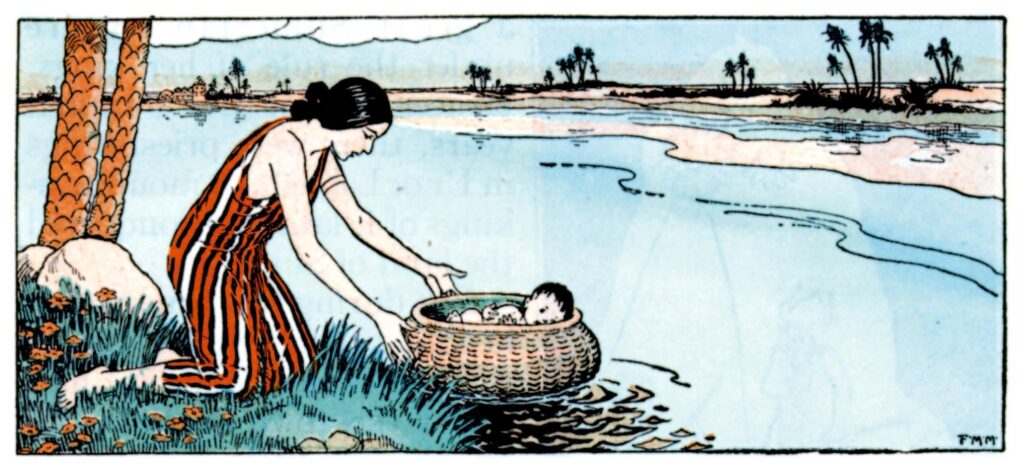
Exodus 19:3, Moses. The name Moses/Moshesh literally means “drawing out or rescued.” What was Moses drawn out of or rescued from? From the waters of the Nile River in Egypt. Water can be a biblical metaphor for humanity, and Egypt a metaphor for Satan’s world. That is to say that Moses was drawn out of or rescued from the seas of humanity. YHVH then used Moses to rescue, draw forth or fish the children of Israel out of the same sea of Satan’s world and lead them to YHVH, which brings us to Mount Sinai. There YHVH gave his people laws that would help to bring them into a loving relationship with him.
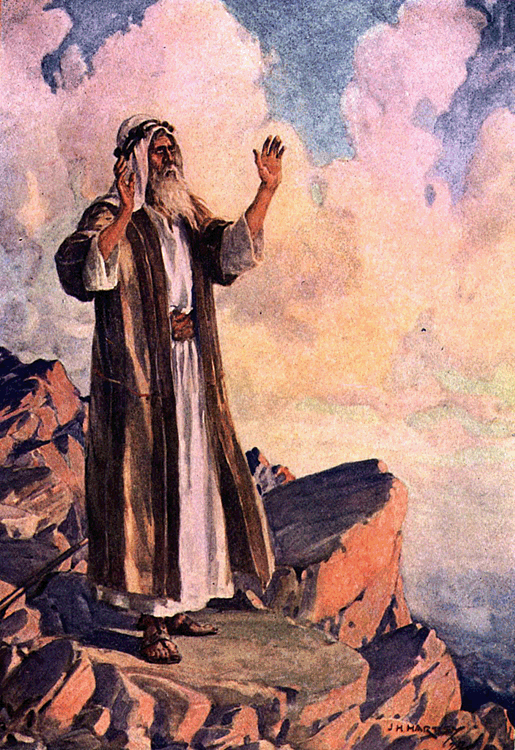
Moses went up to Elohim. Moses acted as YHVH’s intermediary to prepare the Israelites for their “marriage” to him. In a repeat of history, Malachi prophesied that in the last day YHVH would send other intermediary forerunners to turn the hearts of the children back to the foundations of their faith including the Torah before the return of Yeshua, thus preparing the saints to be the bride of Yeshua (Mal 4:1–6). As YHVH gave the children of Israel, his spiritual bride, three days to prepare themselves to meet him (Exod 19:11), so YHVH is likewise giving his end time saints time to prepare themselves to meet Yeshua, their heavenly Bridegroom at this second coming. As Malachi prophesied and Yeshua alluded to in his Parable of the Ten Virgins, returning to the ancient Torah-roots of the saints’ faith is central to this preparation process.
Continue readingWhat Is the Second Exodus and How Does It Relate to YOU?

In the Book of Exodus, we read about the well known exodus of the children of Israel out of Egypt. In religious Jewish thought, this event is referred to as “the first redemption.” Interestingly and unbeknownst to most Christians, there is another exodus involving YHVH’s people that will occur at the end of the present age and the beginning of the next age. The ancient Jewish sages refer to this event as “the final redemption.” This is because numerous biblical prophecies speak of this final redemption, which we colloquially refer to here as “the second exodus.” When will this second exodus occur, who does it involve and what do these people leave and where to they go? That will be subject of the discussion below.
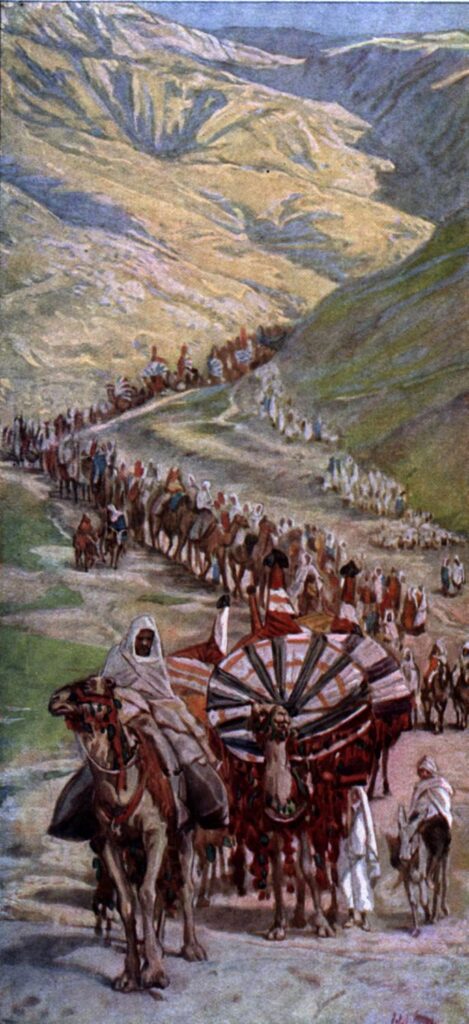
The concept of the Messianic Era in Hebraic thought involves an understanding of both the first and final redemptions, which are two separate events separated by thousands of years. The first redemption or first exodus occurred when the Israelites obeyed the Word of Elohim, and placed the blood of the lamb on the door posts of their homes resulting in YHVH delivering them out of Egypt. It is understood by biblically literate saints that Israel’s exodus from Egypt was prototypical of one’s placing their faith in Yeshua (the Lamb of Elohim) who redeems them from sin’s death grip through his shed blood at the cross, and then leads them out of their spiritual Egypt of sin and worldliness toward the promised land of a new spiritual life in Lord and Savior.
By contrast, the final redemption or second exodus is a series of events that will occur at the end of the age prior to the second coming of Messiah Yeshua at the beginning of the Messianic Era (or Millennium).
For those who have placed saving faith in Yeshua the Messiah, at the final redemption, these redeemed believers will receive their spiritual or glorified bodies at the resurrection of the dead, which occurs at the second coming of Yeshua. After that, they will rule and reign with Yeshua for a thousand years during the Messianic Era.
Now let’s explore several of the notable Bible prophecies that pertain to this long-awaited and glorious second exodus. This will yield us more clues as to the timing of the return of YHVH scattered, redeemed Israelites back to the land of Israel in fulfillment of numerous Bible prophecies.
Isaiah 11:10–12:6
Although consisting of only two chapters, this passage of the Scriptures is part of the same prophecy and speaks about the coming of Messiah, and the regathering of the outcasts of Israel from the nations to which they have been scattered. Below is a list of the salient points that pertain to the second exodus along with my commentary.
Isaiah 11:10, The root of Jesse (i.e., Yeshua the Messiah) will be an ensign or banner to the Gentiles of the nations. We know that Yeshua was that root or offspring of Jesse (King David’s father) who commanded his followers to preach the gospel to the Gentile world. The gospel has gone to the entire Gentile world only in the 20th century via the means of modern travel and mass communications.
Isaiah 11:11, The prophet, here, is referring to another group of people—a remnant of his people (the outcasts of Israel, verse 12) including both Jews (verse 12) and Ephraimites (verse 13, referring to the northern ten tribes of Israel) as opposed to the larger group of Gentile believers from among the nations (who have heard the gospel message) referred to in verse 10. YHVH will recover his people—the remnant of Israel—the second time (i.e., the second exodus) from all lands including the islands of the sea (North and South America, England, Australia, Japan, etc.).
Isaiah 11:12, YHVH will set up an ensign or banner for the nations and shall assemble the outcasts of Israel and the dispersed of Judah. Yeshua is that banner. Even though Yeshua is the ensign for the Gentiles of the nations and for the remnant outcast of Israel who are scattered among the nations, only the outcasts of Israel will be regathered along with the dispersed of Judah.
Isaiah 11:13, It is among this remnant group of scattered redeemed Israelites and dispersed redeemed Jews that peace between the two groups will occur. How may we ask are these two previously antagonistic groups brought together? This can only occur through a common adherence to Torah and a belief in Yeshua the Jewish Messiah through whom both Jews and Gentiles are merged spiritually to become “the one new man” (Eph 2:11–19). At the same time, the adversaries of Judah and Ephraim (the Edomite–Philistines or Moslems and their Islamo-fascist terrorist axis of evil comrades) will be cut off.
Isaiah 11:14–15, Together, Judah and Ephraim will defeat Edom, the Philistines of the West Bank and Gaza along with Moab. (Note that all these enemies of Israel are Moslem nations! Compare this with the prophecies of Obad 18 and Zech 9:13.) Perhaps there are two groups of Jews (from the tribe of Judah) and Ephraimites: the remnant and the greater group. It appears that greater or national (secular) Judah and national (secular) Ephraim will defeat Edom, as it seems less likely that a remnant of Yeshua-followers (the end times Torah-observant saints) will be the ones to do this.
Isaiah 11:16, The scene switches back to the remnant again where a highway will be formed for YHVH’s people to return to Israel from Assyria (the ancient, original nation of their captivity). This second exodus will be similar to Israel’s leaving Egypt the first time. As YHVH led ancient Israel through the wilderness en route to the Promised Land, he will do the same in the last days when Israel will return to the land of Israel from the nations worldwide to which these people eventually wandered in exile.
Isaiah 12:1–12, This chapter describe a millennial setting which occurs after the second coming of Yeshua the Messiah. For example, verse three is understood in Hebraic thought to be a reference to Hoshana Rabbah, the last great day of the fall biblical Feast of Tabernacles (or Chag haSukkot), which is a prophetic picture of the Millennium when the Spirit of YHVH will be poured out upon the earth.
Now let’s note Isaiah 11:10–12:6 in the broader context of the chapters following this passage. There is additional understanding to be found as to the timing of Ephraim’s return to the land (which the ancient Jewish sages call “the Final Redemption” and we refer to as “the Second Exodus” by examining the event foretold therein.
Isaiah 13:6, 9, 13 speak of the day of YHVH’s wrath, which occurs at the end of the age when YHVH will judge the nations as described in the seven bowl judgments of Revelation 15 and 16. The wrath in Isaiah 13 is directed at Babylon, and in Revelation 15 and 16 YHVH’s wrath is toward the nations of the world that come under the economic-political-spiritual biblical label of “Babylon the Great,” which is a greater, world-ruling version of the original Babylon. Because of the proximity of Isaiah chapter 11 describing the second exodus to Isaiah chapter 13 prophesying the fall of Babylon, it would appear that these two events are related.
Isaiah 14, After this, chapter 14 goes on to talk about the fall of the king of Babylon in verses 13 through 20, and then curiously links this to Lucifer’s (Satan’s) rebellion against YHVH and his fall from glory and his eventually being cast into a pit (verse 15). The Book of Revelation speaks of similar events—Satan’s fall from heaven (Rev 12:7–9), Babylon the Great’s destruction (Rev 18), and Satan’s being cast into the bottomless pit (Rev 20:1–3). Are Isaiah and John’s prophecies speaking about the same events that are to occur at the end of the age, and to YHVH’s end times judgment of Babylon the Great with Satan the devil as its head (see Rev 13, 18, 19 and 20)? This could be the case. In time, as end time prophecies come to pass, we will know for sure.
Isaiah chapters 14 through 20 then goes on to prophecy another judgment against the king of Babylon, then a judgment against the Assyrians, Philistines (Isa 14), Moab (Isa 16) and Syria (Isa 17) and America—a land beyond and due west of Ethiopia that is accessible only by ocean ships (Isa 18), and, finally, judgment upon Egypt (Isa 19–20).
Isaiah 21 then revisits the fall of Babylon where in verse nine the phrase “Babylon is fallen, is fallen” is repeated as if to say that Babylon fell once, but that it will fall again in the end times. Most people are familiar with this phrase from John’s Book of Revelation (Rev 18:2), but are unaware that John is actually quoting Isaiah. It is as if John is calling our attention to Isaiah’s prophecy as a corollary antecedent statement that relates to his own prophecy.
Isaiah chapters 21, 23, 24 then go on to pronounce judgment against Edom and Arabia, against Phoenicia (Isa 23) and then against the whole earth (Isa 24). Could these prophecies of Isaiah be what John is seeing in Revelation when he describes YHVH’s bowl judgments against the whole earth just prior to the return of Yeshua (Rev 15 and 16), which John refers to as the wrath of Elohim (Rev 14:19; 15:1,7; 16:2,19)? In the chronology of the Book of Revelation, the fall of Babylon the Great occurs after the bowl judgments of the wrath of Elohim are poured out upon the whole earth. After this, Yeshua returns to this earth with his heavenly army to bring final judgment upon the armies that have gathered at Armageddon (Rev 19 and Jude 14–15). At this time, Satan and his Antichrist confederacy, who dared to exalt themselves against YHVH and his Anointed One, will be dashed to pieces and destroyed for good (Ps 2:1–12; Rev 19:11–21; 20:1–3)!
So we see from this series of passages additional clues as to the timing of the second exodus and the return of Ephraim to the land of Israel. As the first exodus of Israel from Egypt occurred in conjunction with Egypt’s judgment and demise, so it appears that similar events will surround the second exodus. YHVH will judge all the nations which are part of end times Babylon the Great as well as the devil, who is the instigator of man’s rebellion against YHVH-Yeshua, and then the dispersed captives of Israel (both Jews and Ephraimite Christians will be set free to return to her promised inheritance.
Perhaps this whirlwind tour of all these prophecies is bit overwhelming, and this analysis may seem to be too broad and speculative. But before jumping to any conclusions one way or the other, let’s continue to examine other biblical prophecies on this subject to determine if a pattern of events will begin to take shape that will shed light on the timing of the return of the saints to the land of Israel as the Bible predicts. After you begin to see how the pieces of the puzzle fit together to form the whole picture, you will be in a better position to determine if there is enough evidence from the whole counsel of the Scriptures to support what I am proposing. As the Scriptures say, “Despise not prophesyings. Prove all things, hold fast that which is good” (1 Thess 5:20–21).
Jeremiah 16:14–15
Continue readingIs There a Connection Between Sin and Sickness?

Is there a connection between the sins we commit and the sicknesses and diseases that come upon us? In many cases, the answer is yes, The Bible has much to teach us on this subject.
Let’s first establish some basic truths.
Everyone will eventually die, so not all sickness is a result of sin (Heb 9:27).
Some sickness is not due to sin, but comes on us so that YHVH might be glorified when the person is miraculously healed (John 9:2–3).
The purpose of some sickness is for spiritual our refinement to bring us to a higher level spiritually as was the case with Job.
In a general sense, pain, suffering and death came upon all men because of Adam and Eve’s initial rebellion against YHVH Elohim in the Garden of Eden. As a result of the “fall of man,” all men have come under this curse and suffer as a result.
Unto the woman [Elohim] said, I will greatly multiply thy sorrow and thy conception; in sorrow thou shalt bring forth children; and thy desire shall be to thy husband, and he shall rule over thee. And unto Adam he said, Because thou hast hearkened unto the voice of thy wife, and hast eaten of the tree, of which I commanded thee, saying, Thou shalt not eat of it: cursed is the ground for thy sake; in sorrow shalt thou eat of it all the days of thy life; thorns also and thistles shall it bring forth to thee; and thou shalt eat the herb of the field; in the sweat of thy face shalt thou eat bread, till thou return unto the ground; for out of it wast thou taken: for dust thou art, and unto dust shalt thou return. (Gen 3:16–19)
Some sickness is a direct result of disobeying YHVH’s commandments; that is to say, it is YHVH’s judgment against that sin. For example, in Exodus 15:26, YHVH speaks about not putting the diseases of Egypt upon his people if they will follow his commandments.
And said, If thou wilt diligently hearken to the voice of YHVH thy Elohim, and wilt do that which is right in his sight, and wilt give ear to his commandments, and keep all his statutes, I will put none of these diseases upon thee, which I have brought upon the Egyptians: for I am YHVH that healeth thee.
The Torah further makes the connection between sin and sickness when it lists the curses for Torah disobedience in Deuteronomy 28:21–22.
YHVH will make the plague cling to you until He has consumed you from the land which you are going to possess. YHVH will strike you with consumption, with fever, with inflammation, with severe burning fever, with the sword, with scorching, and with mildew; they shall pursue you until you perish.
In Deuteronomy 7:15, YHVH again mentions not afflicting his people with the sicknesses of Egypt if they will obey his Torah-commandments.
And YHVH will take away from thee all sickness, and will put none of the evil diseases of Egypt, which thou knowest, upon thee; but will lay them upon all them that hate thee.
Elsewhere, the Bible shows that there is a direct relationship between sin and healing in Psalm 103:3,
Who forgiveth all thine iniquities; who healeth all thy diseases…
“Leprosy” or the infectious skin disease the Torah refers to as tsaraat (Lev 14:34) was a judgment from YHVH against several specific sins.
When ye be come into the land of Canaan, which I give to you for a possession, and I put the plague of leprosy in a house of the land of your possession…
In several instances in the Scriptures, we read that tsaraat was the consequences of a specific sin. In the case of Miriam, it was the sin of pride and rebellion against spiritual authority and using her tongue in an evil manner against YHVH’s spiritual authority (Num 12:1, 9–10). In the case of Gehazi, he became leprous because of greed and lying (2 Kgs 5:20–27). Uzziah, the king of Judah, became leprous because of his pride and rebellion against YHVH when he dared to violate the Torah by burning incense in the temple (2 Chron 26:16–23).
Envy can bring on bone diseases. Envy can also refer to “jealousy and sexual passion.”
A sound heart is the life of the flesh: but envy the rottenness of the bones. (Prov 14:30)
Sexually transmitted diseases are a direct result of sexual promiscuity and idolatry, and is a judgment from Elohim against those who engage in such ungodly practices.
For this cause Elohim gave them up unto vile affections: for even their women did change the natural use into that which is against nature: and likewise also the men, leaving the natural use of the woman, burned in their lust one toward another; men with men working that which is unseemly, and receiving in themselves that recompense of their error which was meet. (Rom 1:26–27)
Yeshua, on several occasions, equates sin and healing. That is to say, he viewed forgiveness of sin and the healing of a disease as synonymous concepts. To him, the sickness was a result of sin.
Whether is easier, to say, Thy sins be forgiven thee; or to say, Rise up and walk? (John 5:24)
Yeshua shows that illness can be a direct punishment for sin, as well, when he states that a man whom he had just healed was sick because of his sin.
Afterward Yeshua findeth him in the temple, and said unto him, Behold, thou art made whole: sin no more, lest a worse thing come unto thee. (John 5:14)
YHVH’s laws of judgment against sin are still in operation even in the so-called “New Testament era of grace.” YHVH struck down and killed Annaias and Sapphira because they lied to the apostles and to the Spirit of Elohim (Acts 5:1–11).
Paul confirms the truth that there is still a correlation between sin and sickness when he states that some within the body of Yeshua get sick and die because of sin. Illness is a direct punishment for sin. Paul teaches that this can occur when a believer doesn’t have the proper fear and respect for YHVH Elohim and those things which are set-apart of kadosh such as blood and body of Yeshua as symbolized in the Passover communion service by the bread and the wine.
For I have received of the Master that which also I delivered unto you, that the Master Yeshua the same night in which he was betrayed took bread: and when he had given thanks, he brake it, and said, Take, eat: this is my body, which is broken for you: this do in remembrance of me. After the same manner also he took the cup, when he had supped, saying, This cup is the new testament in my blood: this do ye, as oft as ye drink it, in remembrance of me. For as often as ye eat this bread, and drink this cup, ye do shew the Master’s death till he come. Wherefore whosoever shall eat this bread, and drink this cup of the Master, unworthily, shall be guilty of the body and blood of the Master. But let a man examine himself, and so let him eat of that bread, and drink of that cup. For he that eateth and drinketh unworthily, eateth and drinketh damnation to himself, not discerning the Master’s body. For this cause many are weak and sickly among you, and many sleep. For if we would judge ourselves, we should not be judged. But when we are judged, we are chastened of the Master, that we should not be condemned with the world. (1 Cor 11:23–32)
When trials of our faith fall on us including sickness and disease, Scripture instructs us to receive it with joy realizing that this is occurring for our spiritual refinement. Then we are told to ask YHVH for wisdom presumably to help us to understand why the trial is occurring, so that we can repent of sin and learn from our mistakes.
My brethren, count it all joy when ye fall into divers temptations; knowing this, that the trying of your faith worketh patience. But let patience have her perfect work, that ye may be perfect and entire, wanting nothing. If any of you lack wisdom, let him ask of Elohim, that giveth to all men liberally, and upbraideth not; and it shall be given him. (Jas 1:2–5)
Let us not forget that whom our Father in heaven loves he chastens. Sickness often is a form of loving chastisement or discipline from YHVH Elohim,
And ye have forgotten the exhortation which speaketh unto you as unto children, My son, despise not thou the chastening of YHVH, nor faint when thou art rebuked of him: for whom the YHVH loveth he chasteneth, and scourgeth every son whom he receiveth. If ye endure chastening, Elohim dealeth with you as with sons; for what son is he whom the father chasteneth not? But if ye be without chastisement, whereof all are partakers, then are ye bastards, and not sons. Furthermore we have had fathers of our flesh which corrected us, and we gave them reverence: shall we not much rather be in subjection unto the Father of spirits, and live? For they verily for a few days chastened us after their own pleasure; but he for our profit, that we might be partakers of his holiness. Now no chastening for the present seemeth to be joyous, but grievous: nevertheless afterward it yieldeth the peaceable fruit of righteousness unto them which are exercised thereby. Wherefore lift up the hands which hang down, and the feeble knees; and make straight paths for your feet, lest that which is lame be turned out of the way; but let it rather be healed. (Heb 12:5–13)



